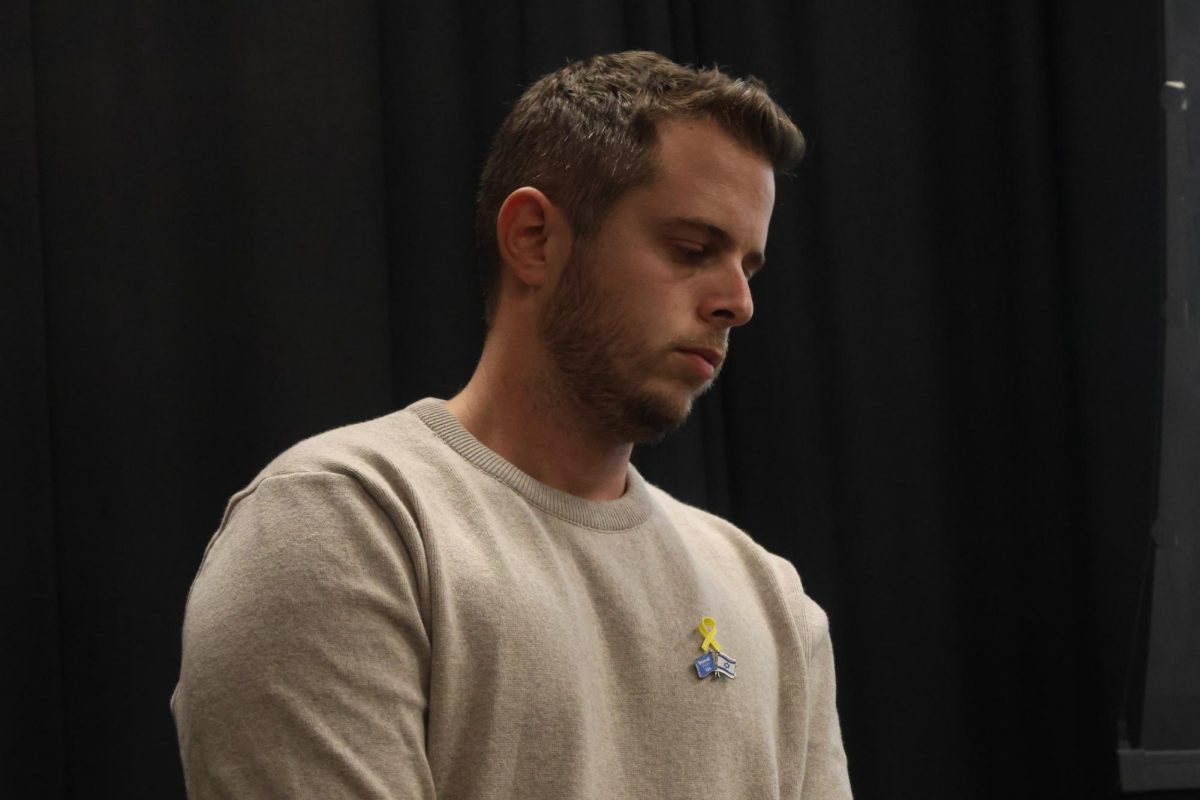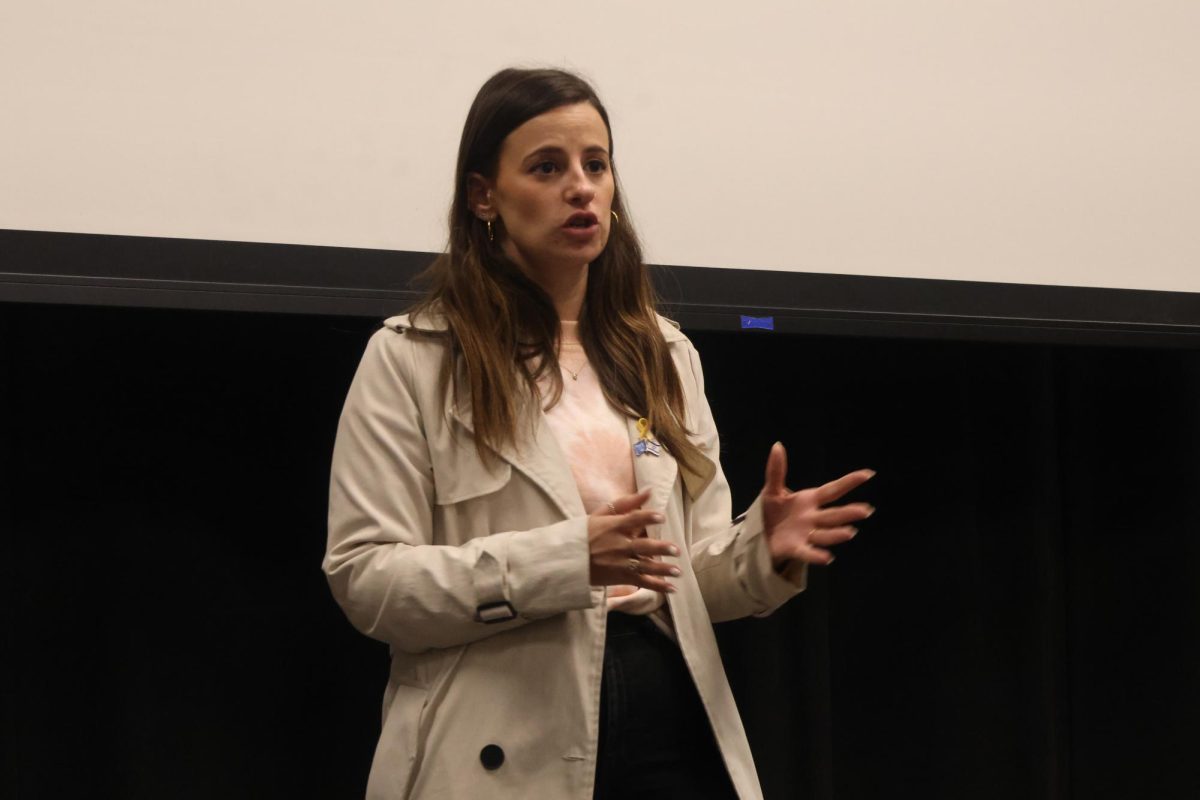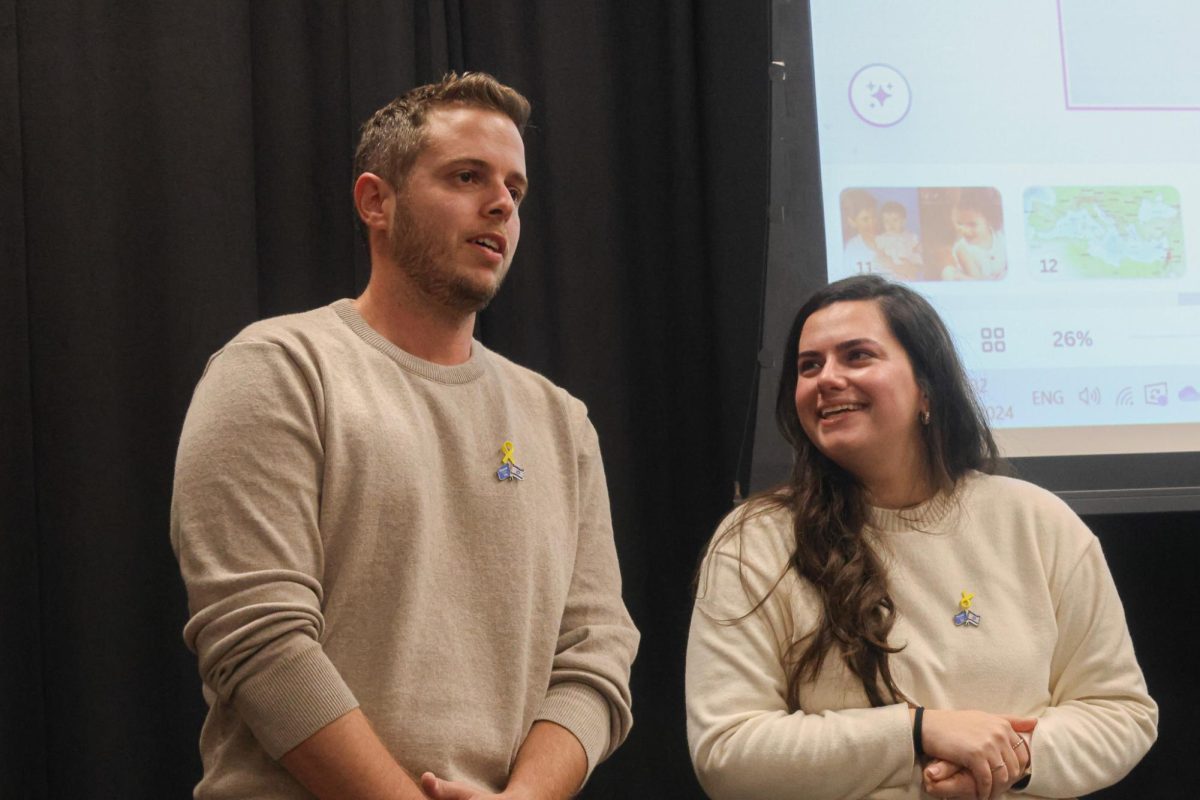Two adult Israelis described their experiences serving in the IDF following Hamas’ Oct. 7 attacks in Ahmanson Lecture Hall on Feb. 28. Neta Zeevi and Avital Yari were invited to speak by Jewish Club during lunch on behalf of StandWithUs, a worldwide nonprofit dedicated to educating about Israel and combating antisemitism.
Zeevi and Yariv are alumni of the StandWithUs Israeli fellowship, a program for aspiring Israeli students to uphold the nonprofit’s values of fighting antisemitism, raising awareness and representing the state of Israel. At the speaker event, the two each presented their narratives from the day of the attacks and described their personal responses to the war, both having lost loved ones to Hamas.
Zeevi grew up in Sde Nitzan, a small agricultural community about four-and-a-half miles from the Gazan border. He said his life was peaceful as a child raised in his moshav, Hebrew for settlement or a community.
“It’s the best place in the world,” Zeevi said. “And you have the best childhood ever. You walk barefooted in the moshav. In the road, you’re playing soccer with your friends. Basically, Sde Nitzan was my private heaven.”
But in 2005, when Israel disengaged entirely from the Gaza Strip, Hamas brigades began shooting rockets at cities and civilian communities in protest of Israel’s new blockade of the enclave. As a result, Zeevi learned at a young age how to quickly access bomb shelters and safe rooms, with rockets frequently sent into his hometown. He said the constant threat of rockets was frightening, especially at a young age.
“This is an original photo of a rocket part that landed in one of my friend’s backyards,” Zeevi said, showing the crowd a picture of shrapnel in a yard. “This is how we were living. And as a kid at first, it’s nice. We had four or five days a year off in school. I could visit my grandma. But after that, it means you have no routine, no friends and no family.”
Since Zeevi’s parents are divorced, on the morning of Oct. 7, he was staying with his mother in central Israel, while his father was in Sde Nitzan. Upon learning of the arrival of terrorists, his father had climbed onto the roof with a pile of bricks, weaponless, but the attack was stopped at a junction outside the town by armed civilians and special forces.
Throughout the day, as Zeevi learned more about what had happened to those in the community, he decided that he wanted to enlist in the reserves and help the affected kibbutzim recover. Later on, as Zeevi stood in another kibbutz north of his home, assigned to defend it, he said he had begun to learn the scale of the attacks around him.
“While driving down the roads of this amazing area, which are usually characterized with green hills and side roads, you get to see life stories end in a second,” Zeevi said. “You can see burned cars on the way. Some of them have baby seats inside. And you can only imagine what happened to them. Seeing this region in this apocalyptic mode, it’s something that I haven’t processed yet and I think I never will.”

Eventually in November, Zeevi’s unit was called to enter the Gaza Strip and provide logistics and intelligence, as well as provide aid to wounded soldiers. There, despite the danger in Gaza, Zeevi said he realized he had done his part to help protect and serve his country as an Israeli.
“My own mission was to try and protect my home, to ensure that nothing like October 7 will happen again,” Zeevi said. “I would die for that. Every time that I heard that the IDF terminated rocket launchers, I knew that my family and friends in the region would be way safer. I understood perfectly why I was there, how important it was to protect the future of my family and friends, and my country that I love.”
Yariv presented her story afterwards. Like Zeevi, she had prior military experience, having served in the IDF for seven years as a lieutenant and a captain. Although Yariv was not in southern Gaza at the time of the invasion, she immediately received a call for service, and left her home the same day of Oct. 7.
While driving in the streets of her home, Yariv said she feared that terrorists would show up in the road at any point, and start shooting. Nevertheless, she made it to the IDF control center, where for about the next week, she would compile information of Israelis in the south, who were either missing, killed or taken hostage.
But as the first recipients of the information, Yariv and her fellow officers had to relay the information to higher command. Yariv said that she had seen pictures posted online of people whose conditions were unknown, and although she had known whether or not they were missing or killed, she was not allowed to disclose the information.
The guilt associated with the job, Yariv said, was extremely difficult to bear.
“We were not allowed to say anything,” Yariv said. “And I think that’s one of the hardest experiences I felt. Because maybe I wasn’t in the field. But inside myself, I was in a fight. For 10 days, I saw stories of people that I know that are missing, and I was not allowed to say a thing. So every [time we saw], we would break down.”
Later in the week, Yariv had learned about the death a good friend, having received a phone call about his found body. Nevertheless, she kept working, and eventually, at the end of a week of phone calls and investigating, she was able to rest.
Yariv said her experiences following Oct. 7 have taught her about the resiliency of the Jewish people when faced with adversity, an existential threat, even.
“I didn’t imagine in my dreams that I would have such strength in hard times,” Yariv said. “I think that’s my lesson for all of us, and for the Jewish people. That even in the hard times that we’re dealing with right now, we do have strengths in ourselves, strength we didn’t think that we probably had.”
Director of Israeli Student programs Rotem Benkel, who organized StandWithUs’ most recent tour in the U.S., said even months after the initial attack, StandWithUs has continued to raise awareness about Hamas’ goals as a terror organization, and has continued to educate others worldwide about the attacks.

“For all of us in Israel, this war is still going on,” Benkel said. “For example, my fiancé right now is fighting in the northern border of Israel, and I’m here, not seeing him for a month. It is really important for us to remind the world that we are still fighting. It’s not a two month thing for us. It’s still going on every day.”

































student • Apr 26, 2024 at 1:36 am
FREE PALESTINE! Why don’t you guys talk about the 30,000 people who have died in Gaza? Journalist are suppose to be unbiased yet you only write about Israel and the IDF?!?